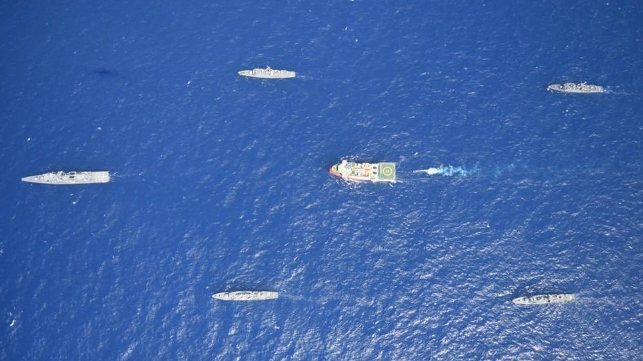Turkish Navy Escorts Seismic Ship Into Greece's Continental Shelf Zone

In a highly symbolic move, Turkey has deployed a government-owned seismic survey vessel to waters within Greece's outer continental shelf claim. The decison has raised concerns about rising regional tensions, particularly as the Oruc Reis is operating in formation with an escort of five Turkish Navy surface combatants, with others staged nearby.
The Oruc Reis' voyage is the latest in a long-running tit-for-tat exchange over the right to drill for gas in the Eastern Mediterranean. Turkey contests the right of Greek-aligned Cyprus to drill within Cypriot waters, and it has previously deployed naval forces to discourage or block Cypriot-licensed drilling contractors. In February 2018, Italian oil major Eni gave up on a Cypriot exploration lease after a protracted confrontation with Turkish Navy vessels.
Last year, Turkey signed a controversial maritime demarcation accord with the recognized government of Libya, without Greek participation. The bilateral agreement purported to settle overlapping Libyan and Turkish continental shelf claims in the Eastern Mediterranean, lending legitimacy to Turkey's preferred boundaries. The agreement did not acknowledge overlapping Greek and Cypriot-claimed waters, and it drew condemnation from the competing claimants.
Last Thursday, Greece signed a similar bilateral deal with the government of Egypt, setting up an EEZ demarcation line without respect to Turkey's claims in the center of the Eastern Mediterranean. This agreement came as a surprise to the Turkish government, which immediately broke off negotiations with Greece on maritime boundaries, declared the Greek-Egyptian deal null and void, and prepared to conduct a seismic survey campaign in the contested area.
The chart of the coastal states' overlapping claims is unusually complex, and a Turkish visualization may be found here.
According to Kathimerini, Oruc Reis and her flotilla traveled more than 50 nm into the Greek continental shelf claim on Tuesday morning before turning back. Greek officials claimed that the Oruc Reis would not be able to obtain quality seismic data on this voyage due to the large number of military escorts nearby.
"Inspired by our glorious history, the love, trust and prayer of our noble nation, we are determined and able to protect rights, interests and interests in our blue homeland from now until the end," said Turkey's ministry of defense in a social media statement.
In a social media statement posted Tuesday, former Greek prime minister Alexis Tsipras called on the government to take further steps to secure the Greek continental shelf. "While Turkey is taking illegal actions that completely ignore international law and directly violate our sovereign rights, conducting investigations within the Greek shelf, the self-evident obligation of political leadership is not to emit contradictory messages," Tsipras said. "The way these illegal investigations should and can be prevented is known to our armed forces since October 2018, when they attempted it effectively."

that matters most
Get the latest maritime news delivered to your inbox daily.
Tsipras referred to a close-quarters interaction between the Greek frigate Nikiforos Fokas, the Turkish frigate TCG Giresun and the Turkish survey vessel Barbaros Hayreddin Pasa on October 18, 2018. The intercept forced the Barbaros to maneuver.
Barbaros is also currently active in the Eastern Mediterranean: she is engaged in another controversial survey off the coast of Cyprus, including parts of the Cypriot-claimed EEZ.
